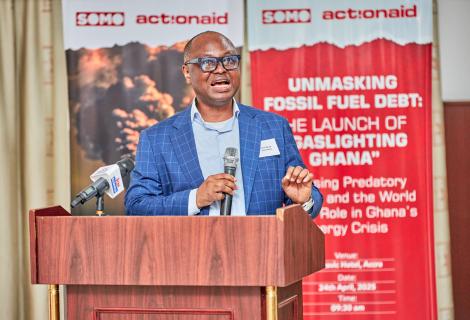Unmasking the fossil fuel Energy Injustice and Fossil Fuel Debt -A Call for Justice in the Face of Fossil Fuel Debt

A Call for Justice in the Face of Fossil Fuel Debt
The official launch of the Gaslighting Report: Ghana’s Fossil Fuel Debt Crisis marks a watershed moment in the country’s long and painful journey toward energy sovereignty, economic justice, and climate resilience. Far from being just another policy paper, this report is a bold and urgent call to action—a confrontation with hard truths, a challenge to unjust systems, and a demand for accountability from those who have compromised Ghana’s energy future.
For years, Ghana has borne the brunt of exploitative fossil fuel contracts brokered under the guise of development. From the West African Gas Pipeline to the Jubilee and Sankofa oil and gas projects, the country has paid dearly—not only in billions of dollars wasted, but in environmental degradation, weakened public infrastructure, and opportunities lost.
As the Gaslighting Report reveals, global financial institutions, including the World Bank Group, and private energy interests have crafted an energy framework that protects profits while externalizing the risks onto the Ghanaian people.
Under take-or-pay agreements and skewed power purchase deals, Ghana continues to pay for gas and electricity it doesn’t fully use, while being pushed further into debt. “Let this report be a resounding wake-up call—not just for Ghana, but for every nation that has been exploited by a system that prioritizes profit over humanity.” The report calls for an immediate review of all inequitable fossil fuel contracts, an independent assessment of fossil-related debt, and the cancellation of illegitimate obligations tied to flawed projects. It demands that the World Bank and private investors not only acknowledge the harm done but take active responsibility for redress.
ActionAid Ghana stands firm in its belief that this crisis cannot be allowed to persist. The time has come for a just and people-centered energy transition—one that puts communities before corporations, renewables before oil, and justice before debt.
Speaking at the launch, the Country Director, John Nkaw asserted that “The evidence is irrefutable. Ghana’s energy value chain is heavily indebted. Our government has paid for gas it could not fully use for many years, and continues to pay for more power than it needs. Let me be clear: this is unsustainable and unjust, and it does not represent the energy future our people deserve.”
Ghana must no longer serve as a testing ground for energy experiments that ignore local realities and undermine our future. As the world faces a climate emergency, we must reclaim our energy system, reinvest in renewable solutions, and chart a new path that serves our people and protects our planet. The Gaslighting Report doesn’t just diagnose the problem—it lays out a roadmap for justice and transformation.
ActionAid Ghana and partner, SOMO are calling for: An immediate review of all inequitable fossil fuel contracts. An independent audit of fossil-related debt. Cancellation of illegitimate obligations resulting from flawed energy deals. Accountability from the World Bank and foreign investors who profited while Ghana paid the price. A bold, people-centered transition to renewable energy that puts communities and the environment first.
As the world accelerates towards climate action, Ghana must not be left behind in a debt trap tied to obsolete and harmful energy systems. Now is the time to reclaim our power—literally and figuratively. Join the movement.
Read the full report here: [https://bit.ly/4jRJwq9] -End-